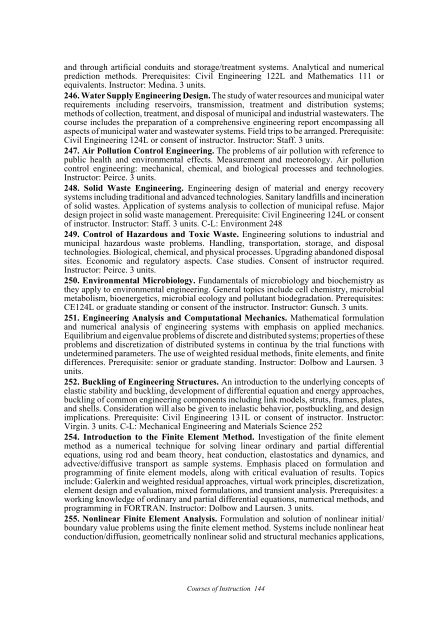Duke University 2008-2009 - Office of the Registrar - Duke University
Duke University 2008-2009 - Office of the Registrar - Duke University
Duke University 2008-2009 - Office of the Registrar - Duke University
You also want an ePaper? Increase the reach of your titles
YUMPU automatically turns print PDFs into web optimized ePapers that Google loves.
and through artificial conduits and storage/treatment systems. Analytical and numerical<br />
prediction methods. Prerequisites: Civil Engineering 122L and Ma<strong>the</strong>matics 111 or<br />
equivalents. Instructor: Medina. 3 units.<br />
246. Water Supply Engineering Design. The study <strong>of</strong> water resources and municipal water<br />
requirements including reservoirs, transmission, treatment and distribution systems;<br />
methods <strong>of</strong> collection, treatment, and disposal <strong>of</strong> municipal and industrial wastewaters. The<br />
course includes <strong>the</strong> preparation <strong>of</strong> a comprehensive engineering report encompassing all<br />
aspects <strong>of</strong> municipal water and wastewater systems. Field trips to be arranged. Prerequisite:<br />
Civil Engineering 124L or consent <strong>of</strong> instructor. Instructor: Staff. 3 units.<br />
247. Air Pollution Control Engineering. The problems <strong>of</strong> air pollution with reference to<br />
public health and environmental effects. Measurement and meteorology. Air pollution<br />
control engineering: mechanical, chemical, and biological processes and technologies.<br />
Instructor: Peirce. 3 units.<br />
248. Solid Waste Engineering. Engineering design <strong>of</strong> material and energy recovery<br />
systems including traditional and advanced technologies. Sanitary landfills and incineration<br />
<strong>of</strong> solid wastes. Application <strong>of</strong> systems analysis to collection <strong>of</strong> municipal refuse. Major<br />
design project in solid waste management. Prerequisite: Civil Engineering 124L or consent<br />
<strong>of</strong> instructor. Instructor: Staff. 3 units. C-L: Environment 248<br />
249. Control <strong>of</strong> Hazardous and Toxic Waste. Engineering solutions to industrial and<br />
municipal hazardous waste problems. Handling, transportation, storage, and disposal<br />
technologies. Biological, chemical, and physical processes. Upgrading abandoned disposal<br />
sites. Economic and regulatory aspects. Case studies. Consent <strong>of</strong> instructor required.<br />
Instructor: Peirce. 3 units.<br />
250. Environmental Microbiology. Fundamentals <strong>of</strong> microbiology and biochemistry as<br />
<strong>the</strong>y apply to environmental engineering. General topics include cell chemistry, microbial<br />
metabolism, bioenergetics, microbial ecology and pollutant biodegradation. Prerequisites:<br />
CE124L or graduate standing or consent <strong>of</strong> <strong>the</strong> instructor. Instructor: Gunsch. 3 units.<br />
251. Engineering Analysis and Computational Mechanics. Ma<strong>the</strong>matical formulation<br />
and numerical analysis <strong>of</strong> engineering systems with emphasis on applied mechanics.<br />
Equilibrium and eigenvalue problems <strong>of</strong> discrete and distributed systems; properties <strong>of</strong> <strong>the</strong>se<br />
problems and discretization <strong>of</strong> distributed systems in continua by <strong>the</strong> trial functions with<br />
undetermined parameters. The use <strong>of</strong> weighted residual methods, finite elements, and finite<br />
differences. Prerequisite: senior or graduate standing. Instructor: Dolbow and Laursen. 3<br />
units.<br />
252. Buckling <strong>of</strong> Engineering Structures. An introduction to <strong>the</strong> underlying concepts <strong>of</strong><br />
elastic stability and buckling, development <strong>of</strong> differential equation and energy approaches,<br />
buckling <strong>of</strong> common engineering components including link models, struts, frames, plates,<br />
and shells. Consideration will also be given to inelastic behavior, postbuckling, and design<br />
implications. Prerequisite: Civil Engineering 131L or consent <strong>of</strong> instructor. Instructor:<br />
Virgin. 3 units. C-L: Mechanical Engineering and Materials Science 252<br />
254. Introduction to <strong>the</strong> Finite Element Method. Investigation <strong>of</strong> <strong>the</strong> finite element<br />
method as a numerical technique for solving linear ordinary and partial differential<br />
equations, using rod and beam <strong>the</strong>ory, heat conduction, elastostatics and dynamics, and<br />
advective/diffusive transport as sample systems. Emphasis placed on formulation and<br />
programming <strong>of</strong> finite element models, along with critical evaluation <strong>of</strong> results. Topics<br />
include: Galerkin and weighted residual approaches, virtual work principles, discretization,<br />
element design and evaluation, mixed formulations, and transient analysis. Prerequisites: a<br />
working knowledge <strong>of</strong> ordinary and partial differential equations, numerical methods, and<br />
programming in FORTRAN. Instructor: Dolbow and Laursen. 3 units.<br />
255. Nonlinear Finite Element Analysis. Formulation and solution <strong>of</strong> nonlinear initial/<br />
boundary value problems using <strong>the</strong> finite element method. Systems include nonlinear heat<br />
conduction/diffusion, geometrically nonlinear solid and structural mechanics applications,<br />
Courses <strong>of</strong> Instruction 144









